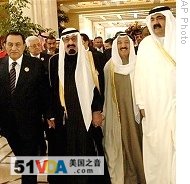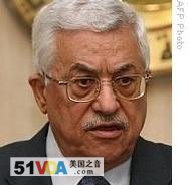Cairo
19 January 2009
Top Arab leaders are meeting in Kuwait to discuss rebuilding Gaza and what to do about a stalled 2002 Arab peace initiative with Israel. The meeting, however, takes place amid deep divisions.
 |
| Egyptian President Hosni Mubarak, King Abdullah of Saudi Arabia, Sheikh Al Sabah, Amir of Kuwait and Sheikh Al Thani, Amir of Qatar (from left) at the Arab Economic Summit in Kuwait, 19 Jan 2009 |
Saudi King Abdallah told fellow Arab leaders that he was declaring an end to "the recent period of quarrels" and "opening the door of unity." He added that he was pledging $1 billion to help rebuild war-torn Gaza.
The monarch, however, addressed his most important words to Israel, warning Israeli leaders not to pass up the chance of peace that was offered to them by the 2002 Arab summit in Beirut because, as he put it, such offers may not last forever.
Israel must understand, he said, that the choice between war and peace will not be offered forever and that the Arab peace proposal that is being placed on the table today will not be on the table forever.
Syrian President Bashar al Assad, however, did not offer an olive branch to Israel, instead calling it a "terrorist state."
He said the most important thing the Arab leaders can do for Gaza is to support its right to self-defense and resistance against Israeli aggression. That aggression, he added, may resume at any moment. Mr. Assad said that since he believes Israel will not change its policies, Arabs must defend the Palestinian cause.
Egyptian President Hosni Mubarak also used strong language to criticize Israel, condemning what he called its "arrogant use of force." But he also went on to urge Israeli leaders to accept the 2002 peace initiative.
I tell Israel, he said, that the arrogance of power will not subdue the Palestinian people and will not bring peace...not all the tanks and planes in the world will bring security to the Israeli people. He also warned the world's great powers that the peace process, neglected for years, must be tackled responsibly. Peace in the Middle East, he insisted, is an urgent matter and cannot wait.
 |
| Palestinian President Mahmoud Abbas (File) |
Israel initially rejected the Arab initiative in 2002, but in the past year has said it could be a starting point for discussion.
Palestinian Authority President Mahmoud Abbas, whose people were the subject and focus of the summit, called for Palestinian unity.
Abbas insisted that what must be agreed to now is a national unity government to cope with the humanitarian catastrophe, lift the blockade, reopen border crossings, and begin rebuilding. Then, he continued, parliamentary and presidential elections should be held, preferably at the same time.
Arab leaders later held a closed-door session and al-Jazeera TV reported King Abdallah invited the leaders of Egypt, Syria, Jordan, and Qatar to his private quarters to discuss their differences.